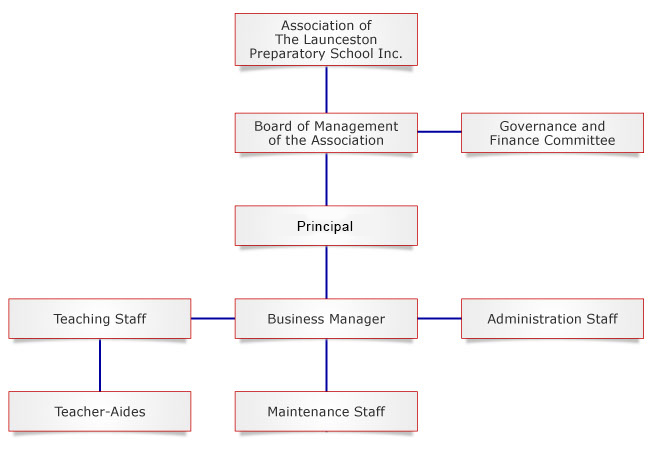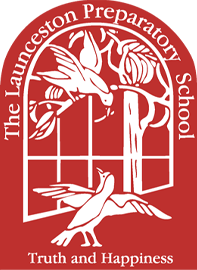Board Members 2024:
Chairperson: Mr Craig Stenton
Deputy Chair (Senior): Ms Hannah Phillips
Deputy Chair (Junior): Mr Simon Ward
Treasurer: Mr Michael Howard
Secretary & Public Officer: Currently shared
Ordinary Members: Mrs Judy Terry, Mr Peter Elliott, Mr Andrew Peck, Ms Maeve McKenna, Mr Louis Benjamin and Mrs Lynette Rieper.
Strategic Plan:
LPS Strategic Plan for 2021 – 2025
School Governance:
The Launceston Preparatory School is an incorporated body administered by its Association under standard rules and articles of association. Membership of the Association is open to all friends of the school comprising current and former parents, educators and supporters from the local community.
Governance and Administrative structure of The Launceston Preparatory School

The Association elects a Board of Management comprising a President, two Vice-Presidents, Treasurer, Secretary and four other members. The Board of Management provides governance and administration in accordance with the Statutory Rules of The Launceston Preparatory School, including financial accountability and policy development.
The Governance and Finance Committee is a committee primarily established to review the policies and procedures of the school and provide recommendations to the Board in accordance with the strategic objectives of The Launceston Preparatory School. Although the Board of Management as a whole is responsible for Governance, it is the view of The Launceston Preparatory School Inc. that a committee should be used to provide guidance regarding governance, finance and policy matters to the Board. The Board of Management is wholly responsible for such matters that are dealt with by the Governance and Finance Committee, which operates under the Board of Management’s direction. Duties of this committee are to:
- develop policies and procedures as required
- oversee budget preparation for the coming year
- establish and monitor compliance with an internal control framework
- monitor the procedures in place to ensure that the school complies with statutory reporting and
other regulatory requirements
- ensure that a Code of Ethics is established and periodically reviewed
- initiate and handle special investigations which are either initiated by the Committee or requested
by the Board
- review reports on the adequacy of insurance coverage
- evaluate capital expenditure projects and financing requirements
- review the financial position and funding requirements at least annually
The Committee is comprised of at least three members of the Board of Management, one of whom is Chairman of the Committee (who will not be the Chairman of the Board). Members of the committee are appointed following each Annual General Meeting. The Principal and the Business Manager are generally invited to attend meetings of the committee. The Governance and Finance Committee can invite participation from other organisations and individuals from time to time (for example, the appointed auditor). Meetings are held as and when required in order to fulfil the Committee’s duties but, as a minimum, twice per annum.
The Board appoints a Principal who is given the responsibility of managing educational issues, students, staff and parent involvement. On behalf of the Board of Management, the Chairman conducts an annual performance review with the Principal. The educational progress and direction of the school is primarily the Principals’ domain. The Board of Management meets with the Principal on a monthly basis receiving comprehensive reports on the day-to-day activities of the school, professional development of the staff, relevant issues from state and federal governments and briefings on policy reviews and curriculum updates.
The Treasurer in conjunction with the Business Manager presents to the Board of Management a monthly financial report detailing actual performance to budget and cash flow projection.
In conjunction with the Principal and through its Governance and Finance Committee, the Board of Management has oversight of all issues relating to risk management and compliance with legal obligations.
Policy development
The Board of Management has the responsibility of policy development and review. This is carried out in conjunction with the Principal.
Staff supervision and leadership
The Principal is responsible for supervision, development and leadership of all teaching and non-teaching staff. This has helped to create an environment in which members of both the teaching and non-teaching staff feel comfortable about approaching the Principal for advice or assistance.
Staff meetings are conducted once each week and are attended by all full-time teachers and most part-time teachers. Non-teaching staff also attend when relevant items are programmed for discussion. Minutes of each staff meeting are maintained and are available for all teaching and non-teaching staff to read each week.
Information that comes to the school regarding professional learning opportunities is brought to the attention of the teaching and non-teaching staff as a whole. Where the Principal or staff members individually have indicated a professional learning need or interest, the Principal and staff members concerned actively seek out and discuss opportunities to meet this need. Much of the professional development of the staff is developed by the Principal and conducted in-house as this can be tailor-made to specifically meet staff needs.
The Principal meets with staff members annually on an individual basis to discuss professional development and to reflect on their teaching practice. The National Professional Standards for Teachers developed by AITSL (Australian Institute for Teaching and School Leadership) are used by all parties to guide reflection and discussion of teachers’ Professional Knowledge, Practice and Engagement.
Financial accountability
The Board, in conjunction with the Treasurer, is responsible for the formation and approval of the annual budget. The Treasurer, supported by the Business Manager, produces the required financial reports, which are presented to the Board for approval on a monthly basis. The financial documents of The Launceston Preparatory School are audited annually by an external auditor.
Educational accountability and reporting
The Board charges the Principal with the responsibility of curriculum development and required educational reporting. The specific processes for these aspects of the school’s operations are detailed elsewhere in this document. As an independent school receiving funds from the Tasmanian and Australian Governments, there are accountability requirements to each of these levels of government. The Principal is responsible for the proper completion and due reporting of compliance with the required regulations.
Duty of care for students
The Principal has the responsibility for the implementation, adherence to and administration of all policies, providing a safe and secure environment for students.
They ensure that issues surrounding duty of care to students are regularly discussed with staff members, putting in place appropriate protocols for the daily supervision of children both in the classroom and school yard and on excursions outside the school. They also ensure that appropriate training in first aid, CPR and Bronze Medallion, asthma and anaphylaxis management, epi-pen administration and other health and safety related areas are provided and updated.

